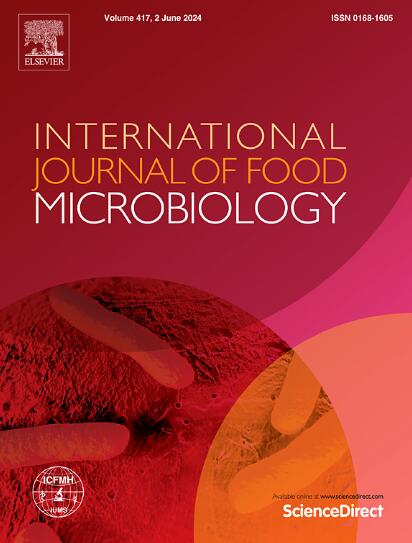PQS信号和温度变化调节铜绿假单胞菌噬菌体感染:食源性病原体控制的意义
IF 5.2
1区 农林科学
Q1 FOOD SCIENCE & TECHNOLOGY
International journal of food microbiology
Pub Date : 2025-08-29
DOI:10.1016/j.ijfoodmicro.2025.111412
引用次数: 0
摘要
铜绿假单胞菌(P. aeruginosa)是一种机会致病菌,在与食物有关的环境中构成重大风险。噬菌体已成为控制铜绿假单胞菌感染的一种有希望的替代策略。值得注意的是,群体感应(quorum sensing, QS)系统在细菌与噬菌体的相互作用中起着重要作用,但我们对其作用的认识仍然不够充分。本文报道了P. aeruginosa中喹诺酮信号(PQS)的合成缺陷显著增加了噬菌体耐药性。PQS对噬菌体感染的调控可能是严格的,因为过量添加PQS并不能降低pqsA突变体的噬菌体抗性。P. aeruginosa PAO1和pqsA突变体在噬菌体吸附方面没有发现差异,这与之前报道的细菌QS系统参与噬菌体吸附不同。更重要的是,我们发现PaΔpqsA的噬菌体抗性是可逆的,因为较高的培养温度可以部分恢复PaΔpqsA的噬菌体敏感性。我们的数据揭示了pqs - QS介导的细菌-噬菌体相互作用的新例子,这可能有助于填补该领域的一些空白,并为制定基于噬菌体的铜绿假单胞菌控制策略提供重要指导。本文章由计算机程序翻译,如有差异,请以英文原文为准。
PQS signaling and temperature variation modulate phage infection in Pseudomonas aeruginosa: Implications for foodborne pathogen control
Pseudomonas aeruginosa (P. aeruginosa) is an opportunistic pathogen that poses significant risks in food-related environments. Bacteriophages have emerged as a promising alternative strategy to control P. aeruginosa infections. Notably, quorum sensing (QS) systems play an important role in bacteria-phage interactions, but our knowledge of the role of QS remains insufficiently understood. Here, we report that the synthesis defect of quinolone signal (PQS) in P. aeruginosa significantly increased phage resistance. The regulation of PQS on phage infection is likely to be rigorous since excessive addition of PQS cannot decrease the phage resistance of pqsA mutant. No differences were found in phage adsorption between P. aeruginosa PAO1 and pqsA mutant, which is different from several previous reports that bacterial QS systems participate in phage adsorption. More importantly, we found that the phage resistance of PaΔpqsA is reversible, as higher culture temperatures can partially restore the phage sensitivity of PaΔpqsA. Our data uncover a new example of bacteria-phage interaction mediated by the pqs QS, which may help in filling some gaps in the field and provide important guidance for developing phage-based control strategies against P. aeruginosa.
求助全文
通过发布文献求助,成功后即可免费获取论文全文。
去求助
来源期刊
CiteScore
10.40
自引率
5.60%
发文量
322
审稿时长
65 days
期刊介绍:
The International Journal of Food Microbiology publishes papers dealing with all aspects of food microbiology. Articles must present information that is novel, has high impact and interest, and is of high scientific quality. They should provide scientific or technological advancement in the specific field of interest of the journal and enhance its strong international reputation. Preliminary or confirmatory results as well as contributions not strictly related to food microbiology will not be considered for publication.

 求助内容:
求助内容: 应助结果提醒方式:
应助结果提醒方式:


